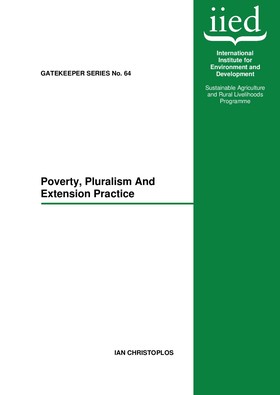Poverty, Pluralism and Extension Practice

Extension is one of the few forums where government and NGO staff actually meet face-to-face with farmers to consider natural resource management decisions. As such, it is an institution through which poverty alleviation, environmental sustainability, gender equality and even democratisation goals can and should be addressed. Whilst extension cannot be responsible for poverty alleviation, it should, however, position itself within the farmers’ own poverty alleviation strategies. Both farmers and extensionists live and work in increasingly turbulent and complex institutional, social and environmental settings. This suggests a need to rethink extension’s role to take into account the challenges as perceived at field level.
This paper draws on the extension literature, as well as the author’s experience with a project in Vietnam’s Mekong Delta, to discuss the implications of using extension to help the poor in this pluralistic environment. The common failures of many extension approaches are analysed. This includes issues such as the inadequacy of assessing extension effectiveness based on simple production and adoption targets; and the fact that many extension institutions still work under simplistic diffusion assumptions that fail to take into account the diversity of activities which fall under the heading of ‘farming’.
Cite this publication
Available at https://www.iied.org/6112iied